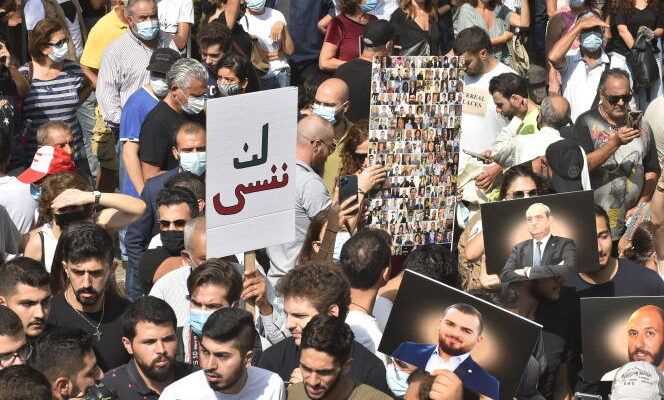The investigation into the deadly explosion at the port of Beirut on August 4, 2020, is at the heart of a new politico-judicial storm. Alone in the tumult, Judge Tarek Bitar faces judicial obstructions, smear campaigns and threats from politicians, desperate to bury an investigation that undermines the culture of impunity that has benefited them so far in Liban. The persistence of the 46-year-old investigating judge in establishing responsibility for the explosion caused by the storage at the port of large quantities of ammonium nitrate, for more than seven years and without precautionary measures, in full view and known from the authorities, strengthens the respect of the families of the victims who demand justice for the 216 dead and more than 5000 wounded.
Like his predecessor Fadi Sawan, challenged in February by the Court of Cassation, Judge Bitar runs the risk of being in turn excluded from an investigation which serves as a test for the independence of the judiciary in Lebanon. Tuesday, October 12, he was forced to suspend for the second time his investigations following complaints of “legitimate suspicion” about his impartiality filed by two deputies and former ministers, who challenge the competence of the judge to prosecute them. “The course of action taken by the politicians in the affair is a travesty of justice. [Ils] file any complaints they can think of to suspend the investigation (…) in a ridiculous attempt to escape justice ”, denounced Aya Majzoub of Human Rights Watch, to Agence France-Presse.
Following the same strategy as his predecessor, Judge Bitar indicted, in July, outgoing Prime Minister Hassan Diab, four former ministers, as well as several security and judicial officials, with “alleged intent to kill, neglect and misconduct”. The latter have since multiplied the recourse and delaying tactics to evade the investigation, with the support of their respective political camps. The hearing of the director general of general security, Abbas Ibrahim, was refused by his supervisory ministry, the interior, while the Supreme Defense Council did not lift the immunity of the director of state security, Tony Saliba, to be heard.
“Political escalation”
This did not change Judge Bitar’s determination. On September 16, he issued an arrest warrant – which was not executed – against the former Minister of Public Works and Transport, Youssef Fenianos, of the Christian Marada party, who did not appear at his hearing. A few days later, he launched the summons against Hassan Diab and the three other former ministers, after the de facto lifting of their immunity in the wake of the vote of confidence granted to the government of Najib Mikati.
You have 69.24% of this article left to read. The rest is for subscribers only.
